Implementation
Overview
The St. Petersburg Area Chamber of Commerce and the city of St. Petersburg have embarked on a comprehensive process to assess and enhance the city’s competitive position to support quality, diverse economic growth now and in the future. As other cities in Florida and across the country focus increased resources and attention on growing their economies, how St. Petersburg is positioned for quality growth is a critical issue to address. Comprehensive quantitative and qualitative research has informed the development of this Grow Smarter Initiative Strategy. Thephases of the Initiative include:
COMPETITIVE ASSESSMENT
The Competitive Assessment presented a detailed examination of the city of St. Petersburg’s competitive position as a place to live, work, visit, and do business. Rather than simply describing data trends, the Competitive Assessment synthesized key findings from the analysis and community input framing the discussion around key “stories” and competitive issues faced by the community.
TARGET BUSINESS ANALYSIS AND MARKETING REVIEW
Using the findings from the first phase, the business sectors that most strongly align with St. Petersburg’s competitive strengths are reviewed and defined. This Target Business Analysis evaluated the city’s workforce, existing economic strengths, global trends, and both obvious and “aspirational” job sectors. The goal of the Target Business Analysis was to identify how to diversify and strengthen the economy through entrepreneurship, existing business expansion, and recruitment. A Marketing Review also assessed the city of St. Petersburg’s principal marketing programs and tools. The following graphic represents the approved target sectors that will drive diverse economic growth in St. Petersburg in the coming years:
Target “niches” represent sub-categories that can be differentiated in terms of compositional subsectors and growth dynamics, but nevertheless share complimentary strategic concerns and competitive advantages such as talent, buyer/supplier networks, infrastructure, technologies, marketing messaging, and others, that warrant them being considered under the same overarching target category. Specific actions to grow the city of St. Petersburg’s recommended target sectors are included in this Grow Smarter Initiative Strategy.
GROW SMARTER INITIATIVE STRATEGY
This Strategy is holistic and inclusive of the many components that affect St. Petersburg’s ability to be a prosperous community. The Strategy’s proposed goals, strategies, and actions have been built from the key findings of the research reports.
IMPLEMENTATION PLAN
While the Strategy represents “what” St. Petersburg needs to do, the Implementation Plan determines “how” to do it. The Implementation Plan will serve as the road map for putting the Strategy into motion. The Implementation Plan outlines the activities of the Strategy’s objectives on a day-by-day, month-bymonth, and year-by-year basis.
Introduction
The “what” related to St. Petersburg’s strategic future has been determined and is represented by the Grow Smarter strategy summarized below. “How” the strategy will be activated, resourced, sustained, and evolved is the focus of this Implementation Plan. It both details key processes to advance the strategy and also presents options for implementation governance and staffing. What is certain is that more capacity and new/enhanced partnerships will be necessary to move Grow Smarter forward. To successfully activate only a handful of strategic recommendations at the expense of others will jeopardize the efficacy of the overall program. If the Great Recession has taught us anything it is that communities in today’s economy must do more than ever before to remain competitive for top jobs and talent.
Grow Smarter Strategy
The quantitative and qualitative Grow Smarter research directly informed the development of the strategy. In the plan, six strategic focus areas (inner circle) combine to positively influence the advancement of three principal goal areas (outer circle), broad categories that represent the city’s future ambitions. The Implementation Committee (center) represents the linkages of implementation partners.

These three goals are:
- People
- Prosperity
- Place
It will be necessary to see positive results in all six strategies and three goals for St. Petersburg to achieve its strategic ambition.
Key Initiatives
The following actions were determined by the Grow Smarter Steering Committee through group discussion and participation on an online comment survey. They represent the most impactful, priority activities that the Grow Smarter implementation team should focus on during the initial months after strategic launch. This team will require contributions from both the public and private sector to achieve success. For example, certain of the Key Initiatives will be led by the City of St. Petersburg, others by the St. Petersburg Area Chamber, and still others through a partnership of city, Chamber, and Pinellas County.
The Key Initiatives are:
- Formalize the development of a Downtown St. Petersburg Innovation District (1.1)
- Proceed with holistic strategies to reduce poverty in South St. Petersburg (1.3)
- Capitalize on citywide development opportunities along key St. Petersburg transportation corridors (1.4)
- Effectively support the growth ambitions of established St. Petersburg companies (2.1)
- Pursue specific actions to grow St. Petersburg’s target business sectors (2.2)
- Develop targeted St. Petersburg external marketing capacity and tools (3.1)
- Promote St. Petersburg as a growing hub for entrepreneurial and startup activity (3.2)
- Enhance the availability of capital for new business formation (4.1)
- Formalize new partnerships to advance “cradle-to-career” education (5.1)
These Key Initiatives are reflected in the First Year Action Plan found in Appendix C of this Implementation Plan report.
Implementation Plan
During the development of the Grow Smarter Strategy, great care was taken to acknowledge, leverage, and incorporate existing efforts into the Grow Smarter framework. The goal of comprehensive community strategic planning is not to “reinvent the wheel” if an existing effort is supported, sustainable, and showing results, but rather to capture it under a broader implementation structure. As such, the Grow Smarter Strategy calls out a number of organizations and programs currently active in making St. Petersburg more competitive and successful; this Implementation Plan then formalizes these partners under the Grow Smarter framework and seeks to identify their roles in advancing the plan. However, there are also many new initiatives that will require an existing or future organization or government to take ownership – either through direct implementation or coordination –in order for the effort to be effectively advanced.
Thus, the Grow Smarter framework seeks to be a strategic “umbrella” that provides a structure for St. Petersburg leaders, practitioners, and citizens to come together in a coordinated and collaborative way to make the city more competitive for the skilled talent and knowledge jobs most in demand. This framework, either directly or indirectly, must also include partners from outside the City of St. Petersburg. Organizations and practitioners in the rest of Pinellas County and the Tampa Bay region operate key programs that are supportive of Grow Smarter initiatives and can supplement local capacity. Regions are the representative geography for analysis related to certain workforce and economic development assessments and projects and cannot be left out of locally-focused efforts like Grow Smarter.
Operations
Successful implementation of the Grow Smarter Strategy will require public and private partners to continue to work together while also forging new relationships. The entity that serves as the lead coordinator for strategic implementation will not be able to activate every strategic activity by itself. It will rely on a network of volunteer leaders and public, private, and civic partners to effectively activate the strategy and achieve sustained results. Community and economic development is a “team sport” and relies on coordinated and collaborative participation from multiple local entities in order to be successful.
VOLUNTEER STRUCTURE
The strength of the Grow Smarter process can be attributed directly to the quality and commitment of the project’s Steering Committee. The public and private leaders who agreed to serve this critical role have been active and engaged in every meeting and responsive to online surveys and comment periods for project deliverables. Continued dedication to the implementation of the plan by these leaders and others in the community will ensure that all the hard work and input that went into plan development will bear fruit through implementation in the months and years ahead.
Coordinating Entity
As will be discussed later, Market Street feels that the City of St. Petersburg is the most logical entity to serve as “Implementation Coordinator” of the Grow Smarter Strategy. The city has the most to gain from successful implementation and is already either working in a number of the strategy’s programmatic areas or has built relationships with the key stakeholders in these arenas. As Coordinator, the city will work with partners to direct the appointment and management of the Implementation Committee and other tasks.
Implementation Committee
At its August 21, 2014 meeting and in a follow up survey, the Steering Committee voted unanimously to stay together as the Implementation Committee. Thus, the leaders that comprised the Steering Committee will stay together, with potentially adjusted membership, to shepherd and oversee the initial implementation of the strategy. While the Committee will have no organizational governance authority over the strategic coordinator or implementation partners, it will nevertheless serve a critical oversight function, ensuring that the key partners engaged in implementation are represented around the table. This will enable the Committee members to assist staff with ensuring that implementation is collaborative, effectively networked, and free of any programmatic redundancies.
The Implementation Committee will be kept apprised of all strategic investments and programming and receive reports from implementation staff and other local partners. The length of time the Implementation Committee is in existence—as well as the frequency of its meetings—will be determined as implementation progresses.
Work Groups
The Steering (soon to be Implementation) Committee also voted in near unanimous support of the development of implementation Work Groups. Each Work Group will be charged with advancing a key Grow Smarter goal, strategy, or groups of strategies. The assembly of these volunteer Work Groups allows those entities currently involved in various implementation activities to meet and discuss how to integrate (and, potentially, expand) their programs and responsibilities to best move implementation forward.
As subsets of the Implementation Committee, each Work Group will be chaired by a member of the Implementation Committee. The membership of each Work Group will include practitioners and representatives of entities that have implementation roles for that strategy. Supported by staff of the City of St. Petersburg and other partners, the Work Groups will be charged with integrating the Grow Smarter Strategy into their own programs of work, identifying gaps between what is taking place and what is proposed in the plan, and working to close those gaps. The number and composition of the Work Groups will be determined by the Implementation Committee, staff, and partners moving forward.
As soon as their members are determined, the Work Groups will begin implementation of their strategic areas and action steps as written. Priorities can be reordered if necessary, but it is important that the Work Groups respect the comprehensive, consensus process that resulted in the determination of the Grow Smarter Strategy. In partnership with the implementation organizations, Work Groups will initially be charged with identifying the current and anticipated capacity needs in terms of programs, personnel, and funding to effectively implement key strategic recommendations .It is also possible that there is an existing group or committee that could serve the role of strategic Work Group, potentially with enhanced membership.
There is also the opportunity for sub-committees of the Work Groups to be formed. In reality, this often happens in Market Street’s client communities. For example, a Culture and Community Work Group could form sub-committees on arts and culture, housing, infrastructure, professional sports, or other strategic elements. The need for and development of sub-committees does not typically occur until after the Work Group has met a number of times.
The following graphic represents a potential volunteer framework for Grow Smarter implementation if each strategy was associated with a work group. The most likely entity to staff each work group is displayed along with the Implementation Committee as the volunteer group encompassing all strategic focus areas. The City of St. Petersburg, as the strategic coordinator, would be charged with staffing the Implementation Committee.
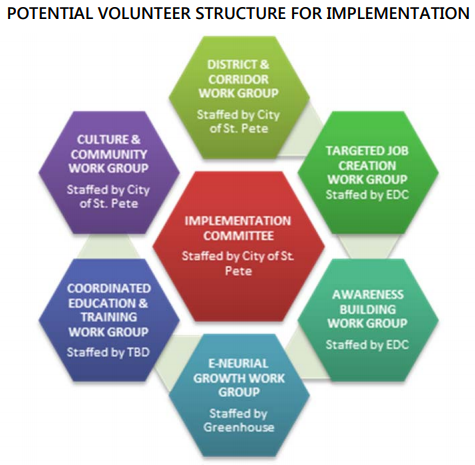
Organizational Structure
Implementation of Grow Smarter will entail the creation and launch of certain efforts and initiatives, but also “jumping on a moving train” of existing and planned activities. Ensuring that all the moving parts of the implementation process are coordinated, connected, collaborative, and complementary requires a sufficient amount of administrative oversight and outreach. Failing to provide the personnel capacity necessary to manage the process creates the risk that strategic implementation will fall short of its full potential.
IMPLEMENTATION COORDINATOR
As noted, Market Street feels that the City of St. Petersburg should serve as the coordinator of strategic implementation. As a key partner in the Grow Smarter planning process, the city has demonstrated that it can contribute meaningfully to a comprehensive strategic initiative. As Implementation Coordinator, the city’s role will be stepped up to include administration of the local entities aligned behind implementation of the Grow Smarter plan. Implementation partners will not be beholden to the city in any way, nor will they report on anything other than implementation activities for the purpose of maintaining an ongoing record of strategic activities among partners.
STAFFING AND STRUCTURE
Implementation of the Grow Smarter plan provides a catalyst for key implementation partners to reassess their staffing and programmatic capacity with an eye towards potentially increasing or repositioning personnel to most effectively implement their components of the plan. With the principal economic development entities in the community – the Chamber, City of St. Petersburg, and Pinellas County – already funding personnel and programmatic capacity to support local job creation, St. Petersburg will not be starting from scratch in this regard. This holds true for other elements of the strategy as well, including small business development and entrepreneurship, workforce development, arts and culture, and others.
City of St. Petersburg and Pinellas County
Unlike many communities across the country, St. Petersburg and Pinellas County have strong capacity to support economic development and related programming. Also unlike most U.S. communities, this capacity is focused more broadly than just personnel dedicated to development regulations and permitting, planning and zoning, incentive provision and assessment, and infrastructure/site preparation.
Because of its current economic development programs and staff capacity, city and county economic development entities must be seen and leveraged as key partners in the St. Petersburg Chamber’s economic development arm proposed later in this report, the Economic Development Corporation (EDC). This includes the potential to complement predominantly private monies with public funds to resource the EDC as well as possible staff co-location in the manner of the Greenhouse partnership. It should be noted, however, that Pinellas County Economic Development (PCED), the county’s development agency, must operate statutorily on a county-wide basis, without bias to any sub-geography (including unincorporated areas). Therefore, though PCED staff can support implementation of the City of St. Petersburg’s strategic plan, the organization is not likely to support direct funding of the EDC over and above levels currently provided to other organizations in Pinellas County.
The following represent the staffing and roles of the City of St. Petersburg Planning and Economic Development Department and Pinellas County Economic Development.
City of St. Petersburg Department of Planning and Economic Development
- Director, Planning & Economic Development
- Manager, Econ. Development/ Greenhouse
- Downtown and CRA Coordinator, Community Redevelopment
- CIP Coordinator, Main Street Program, Gateway Development and Annexations
- Economic Development Analyst, Market Research, Demographics, Incentives
- Mayoral Small Business Liaison (Greenhouse)
- Economic Development Coordinator, Training & Counseling (Greenhouse)
- Economic Development Coordinator, SBE (Greenhouse)
- Economic Development Specialist, Small Business Services and Incentives (Greenhouse)
- Administrative Secretary (Greenhouse)
PINELLAS COUNTY ECONOMIC DEVELOPMENT DIVISION (EFFECTIVE OCTOBER 1, 2014)
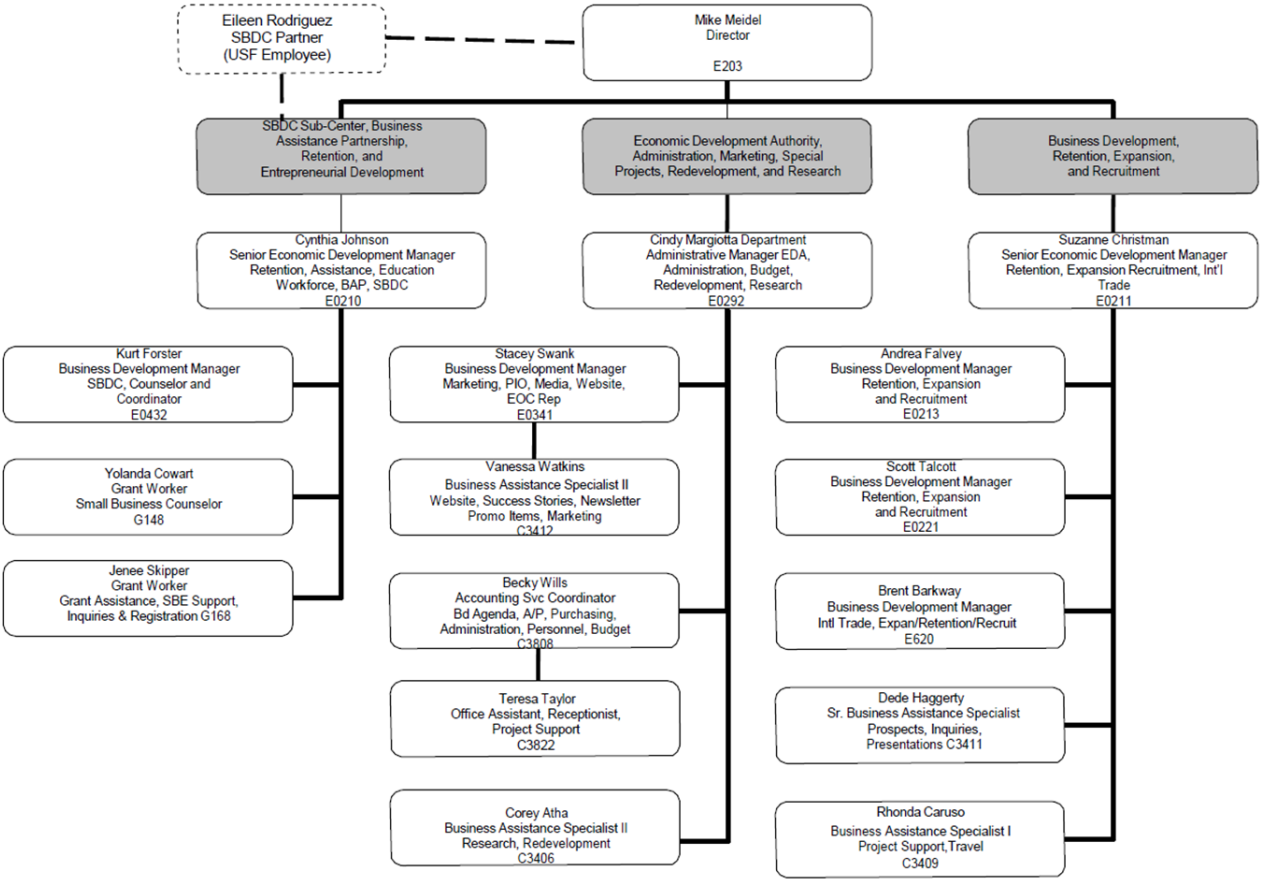
Because of the significant time and administrative demands of coordinating the implementation of a comprehensive economic and community development strategy, it is recommended that the city hire or assign a staff person to serve as the day-to-day administrator of Grow Smarter implementation activities. There is also an opportunity to position the city as the principal support entity for Grow Smarter’s proposed public-private education and training coalition. These two potential new staff positions at the city are outlined below.
STRATEGIC IMPLEMENTATION COORDINATOR
As Market Street’s many clients have discovered, coordinating the implementation of a comprehensive, holistic strategy such as Grow Smarter is a very time- and labor-intensive task. In addition to management of the Implementation Committee, the creation of multiple Work Groups and (likely) numerous subcommittees can result in the engagement of hundreds of local stakeholders in strategic implementation. All of these volunteers must be managed; this includes assisting the Work Group and sub-committee chairs with developing and managing volunteer rosters, scheduling and programming meetings, and recording and reporting meeting minutes. Most importantly, however, the Grow Smarter implementation network must be coordinated and collaborative. This does not happen by accident; the Strategic Implementation Coordinator will ensure that the different Work Groups and sub-committees are interactive and communicating to the degree necessary to ensure integration of strategic efforts, elimination of programmatic overlaps, identification and fostering of programmatic and resource-development synergies, and reporting of implementation progress and successes not only to Grow Smarter volunteers, but also investors and the media. The Coordinator will also help implementation partners “keep score” of Grow Smarter implementation by collecting and reporting activity and performance measures and benchmarks.
CRADLE-TO-CAREER PARTNERSHIP DIRECTOR
The Director would administer the network of public and private entities brought together in an alignment coalition to support cradle-to-career development of students in Pinellas County Schools. These partners would include businesses, education and training providers, social services officials, and other representatives. The Director would oversee the formalization of the partnership, the development of volunteer committees and sub-committees, and direct ongoing research to ensure that the coalition’s efforts are metric-driven and customized to the needs of local children.
St. Petersburg Area Chamber of Commerce
Though it does not currently have an economic development division, the Chamber nevertheless has existing staff capacity dedicated to economic development. This is principally comprised by an Economic Development Manager (who also serves as Manager of the Greenhouse), and an associated Marketing and Administrative Assistant. The Chamber’s Marketing and Communications Coordinator largely supports Chamber programming and membership development activities. The Advocacy Manager works to promote and advance policies that contribute to enhancement of St. Petersburg’s competitive position. The CEO also has a key advocacy role in addition to serving as the Chamber’s top representative to existing and potential businesses.
In order to enhance and formalize the Chamber’s role in economic development, Market Street proposes that an Economic Development Corporation (potentially re-branded) be created as a 501c3, non-profit, public-private affiliate of the St. Petersburg Chamber. It will serve as the Chamber’s economic development division and be governed by a separate Board of Directors. The EDC budget should be comprised of funding from the Chamber, City of St. Petersburg, and, potentially, Pinellas County, along with a host of other sources that legally can contribute to a 501c3 corporation, including government granting entities, community foundations, private foundations, corporate foundations, philanthropists, and other funders. It is important that monies dedicated to implementation of Grow Smarter’s economic development functions be housed in a separate account, with all EDC expenditures tracked separately from Chamber operations and regularly reported back to Grow Smarter investors. Typically, private monies comprise the largest share of not-for-profit public-private economic development organization budgets. As referenced previously, the City of St. Petersburg and Pinellas County have strong existing capacity in economic development that could be leveraged by the EDC. To ensure that the EDC has sufficient capacity to serve a lead implementation role for Grow Smarter strategies 1 and 2 – Targeted Job Creation and Awareness Building – Market Street proposes that the following new or reassigned positions comprise the initial staff of the EDC.
VICE PRESIDENT, ECONOMIC DEVELOPMENT
This new position will direct and oversee the EDC’s economic development operations. Principally, the VP will be in charge of prospect development and management, working with public and private partners to program external marketing trips, a new economic development website, site consultant and other VIP hosting, marketing collateral, and public relations (if budgeted for). The VP will also work with city, county, regional, and state partners to manage prospects interested in St. Petersburg as a location for investment. This will entail coordinating the EDC’s responses to requests for information (RFIs), hosting prospects, and negotiating relocation packages along with economic development partners. Relationship-building will be an essential component of this position, both with corporate representatives, site selection professionals, and state and regional economic development personnel.
Salary Range: $75,000-$100,000
EXISTING BUSINESS MANAGER
This position will implement St. Petersburg’s proposed economic gardening program and work with city and county economic development partners in support of business retention and expansion programming. This includes working with the city and county to formalize a coordinated program, including the identification of businesses to visit, the frequency of visitation, and the survey instrument used for the sessions. Working with the EDC’s Research Coordinator and research staff at the City of St. Petersburg, the Manager will maintain the database of BRE-related information gleaned from the visits and communicate/coordinate with workforce development, advocacy, and marketing staff to ensure that the concerns, needs, and growth opportunities of existing businesses are addressed and advanced. The Manager will also be charged with overseeing the development, coordination, management, and leveraging of the proposed Financial Services Council (strategy 2.2.3).
Salary Range: $50,000-$65,000
RESEARCH COORDINATOR
The Research Coordinator will manage the EDC’s suite of research services for internal programs and contribute research to external partners as needed. The Coordinator will ensure that the EDC’s website contains comprehensive and updated data on local economic and demographic trends and detailed information on St. Petersburg’s target business sectors. In addition, the Coordinator will work with the VP of Economic Development to help optimize planning for external marketing trips as well as follow-up research after meetings and prospect visits. Lastly, the Coordinator will support the Existing Business Coordinator in the development, management, and leveraging of St. Petersburg’s BRE database.
Salary Range: $40,000-$55,000
ADMINSTRATIVE ASSISTANT
The Assistant will support the Vice President of Economic Development and administer the operations of the EDC for the benefit of staff, partners, and investors.
Salary Range: $35,000-$50,000
Action Timelines
The development of action timelines is designed to assist the strategic implementation coordinator – the City of St. Petersburg – and its partners with effectively launching, phasing, and sustaining the Grow Smarter plan’s implementation.
PRE-IMPLEMENTATION
Initial months of activation of Grow Smarter will focus on outreach, engagement of implementation partners, resource and capacity building, and awareness-building of the process among local, county, and regional stakeholder groups, organizations, institutions, and governments.
Market Street recommends that the activation of the strategy begin quickly, in the first quarter of 2015, to build critical early capacity and capitalize on momentum generated by the completion of the planning process. Market Street also feels that potential foundational investments by partners such as the new Bayfront Health, Education and Research Organization, Inc. (HERO) can provide much needed early capacity to move the strategic launch date forward.
A list of pre-implementation activities can be found in Appendix A of this report.
IMPLEMENTATION PARTNERS
A strategy as aggressive and holistic as Grow Smarter cannot be implemented by a single organization, or even two. Achieving successful and sustained results in strategic implementation will result from the creation of an implementation network of key local, county, and regional partners united and aligned in the pursuit of quality job growth in the City of St. Petersburg. Supportive efforts of key partners will be coordinated by the Strategic Implementation Coordinator working under the auspices of the city to ensure that Grow Smarter implementation is optimally configured, integrated, and collaborative.
A list of key implementation partners is found in Appendix B of this report.
FIRST YEAR ACTION PLAN
The Grow Smarter key initiatives selected by the project Steering Committee represent the most impactful activities included in St. Petersburg’s strategic plan. Though most will not be completed in the first year – in fact, many are ongoing actions – these strategies were determined to provide the greatest early return on investment and do the most to enhance St. Petersburg’s competitive position and advance its positive job and wage growth.
In addition to comprising all of the strategy’s key initiatives, the First Year Action Plan also captures a number of ongoing efforts that are in various stages of implementation. One of the benefits of developing and activating a comprehensive, city-wide economic and community development strategy is the opportunity to incorporate programs and initiatives from multiple partners under a coordinated implementation framework. This reality is reflected in the First Year Action Plan, which is a strong mix of new, aspirational activities as well as enhanced and ongoing efforts.
The First Year Action Plan can be found in Appendix C of this report.
Grow Smarter Implementation Framework
The implementation of a strategy as comprehensive as Grow Smarter by necessity requires that a team of partners come together to develop, advance, and coordinate a number of activities associated with the plan’s strategic recommendations. The City of St. Petersburg will serve as the strategy’s Implementation Coordinator, overseeing the management of the Implementation Committee and Work Groups. However, other partners will need to step up to assume initial – and potential long-term – staffing and funding responsibilities for a host of other actions. If partners do not step up and assume personnel and fiscal responsibilities, these actions will simply not be implemented. This would compromise the overall vision of Grow Smarter and potentially diminish its full impact.
FIVE-YEAR IMPLEMENTATION FRAMEWORK
It is Market Street’s experience that once outreach has been made to implementation partners and the Work Groups have been confirmed, the very first step practitioners and volunteers take at their initial meetings is to review the strategy and Implementation Plan, the proposed prioritization and phasing of activities, estimated costs, and lead and support entities, and conform them to their perspectives and preferences. Using the strategic reports as guides and templates, the Work Groups formalize an implementation timeline and structure based on, 1) their reprioritizations, 2) existing staffing and fiscal capacity, 3) application to their organizational missions, 4) relationship to their existing/future programs, and 5) potential impact. Based on these initial assessments, implementation partners assume either longterm or temporary ownership over one or more strategic activities.
However, there are always potentially impactful activities that do not find even a temporary “home” in terms of being incorporated into a partner organization’s program of work. It is the responsibility of the City of St. Petersburg as the implementation coordinator to work with local partners to try to identify an entity that can take ownership of a strategic recommendation, even if that means supporting them in the identification and/or pursuit of resources that would enable them to assume this role.
Market Street has attempted to present a framework for Grow Smarter’s five-year implementation period that determines both short- and long-term ownership of every strategic action, including the governance, staffing, and funding of those actions. It is hoped that this framework will serve as a guideline for the City of St. Petersburg and its partners as they attempt to advance as many strategic opportunities as possible.
The Five-Year Implementation Framework can be found in Appendix D of this report.
Economic Development Corporation Budget
Because, at this point in the implementation process, it has been determined that the only resource campaign associated with Grow Smarter will be to support the funding of the Chamber’s new Economic Development Corporation, Market Street has limited strategic budget estimates to the costs associated with the EDC’s staffing and programs. If it is ultimately decided to resource programs and personnel beyond the EDC through an external campaign, the City of St. Petersburg and its implementation partners will assess implementation costs for additional line items and incorporate them into the resource campaign.
It must be noted, however, that effectively implementing Grow Smarter will take additional resources that must be generated by the Chamber, city, county, and other partners adopting and/or enhancing programs not implemented by the EDC. These estimates and needs will be determined and developed by these organizations and governments themselves outside the purview of the EDC.
The eventual EDC budget should be comprised by a private-sector majority stake and be directed towards a non-profit 501(c)3 corporation or foundation. Economic development has been determined to be a “public-serving” activity and is thus eligible for tax-deductible donations from corporate foundations and other philanthropic entities as well as government funds at all levels. Local leaders have determined that the existing Bay Area Chamber Foundation is an appropriate vehicle to serve as funds-recipient for the EDC. It will have to be repurposed, renamed (potentially), and have a reconfigured Board of Directors to serve this purpose. These activities are accommodated in the pre-implementation phase of Grow Smarter activation.
By creating a new public-private economic development corporation, the St. Petersburg Area Chamber also allows for strategic implementation monies to be raised, housed, tracked, and reported independently of the Chamber’s operating budget to maintain transparency and enable accurate reporting of all expenses related to strategic staffing and programming. All strategic donors should be treated like corporate investors and provided quarterly and annual updates of implementation progress and be acknowledged for their commitment and contributions to the City of St. Petersburg’s future.
As has been noted, the opportunity exists to leverage the newly formed HERO foundation as a key early funder of strategic implementation. In many U.S. communities, community foundations have identified comprehensive economic, community, and workforce development strategies as worthwhile investments in service of their organizational missions.
The following tables represent Market Street’s initial estimates of strategic implementation costs based on the phasing of the Economic Development Corporation’s strategic activities and proposed staff. It is very important to note that these budget estimates DO NOT take into account the potential for existing staff and programs to be redirected towards the new EDC.
ECONOMIC DEVELOPMENT CORPORATION PROGRAMMATIC BUDGET
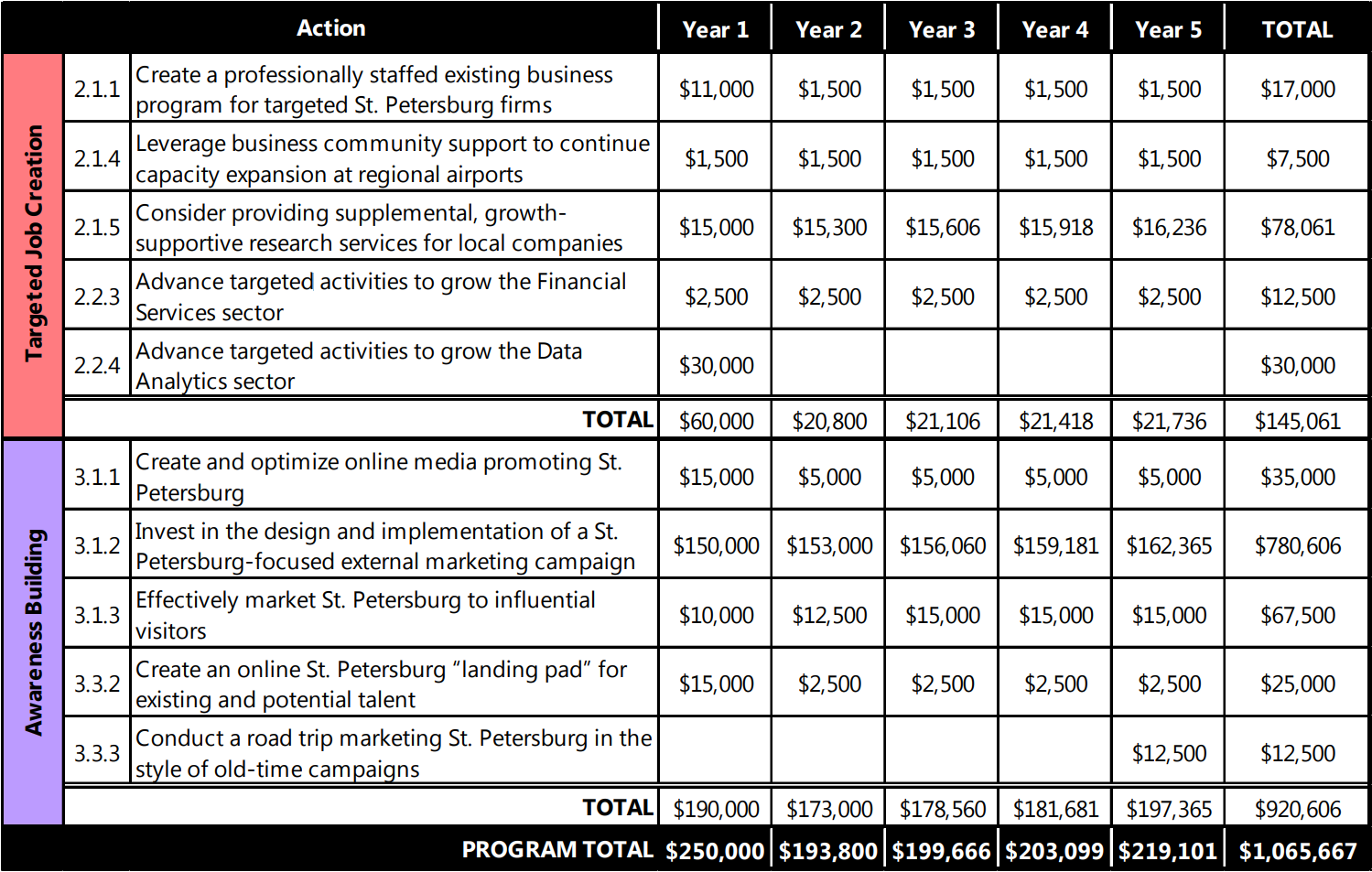
It is estimated that the EDC’s programs over the course of the five-year implementation period will cost just over $1.0 million to effectively implement. As seen in the previous table, this estimate only takes into account the strategic activities directly implemented and owned by the EDC.
The following staffing estimates are derived from the midpoints of estimated salary ranges for each position. It is assumed that:
- The St. Petersburg Area Chamber will provide administrative assistance to the EDC for the first year of its operations; and
- Research services will be provided to the EDC for the first two years of its operations, potentially by the City of St. Petersburg or another partner.
First-year EDC hires include the Vice President of Economic Development and Existing Business Manager.
ECONOMIC DEVELOPMENT CORPORATION PERSONNEL BUDGET

Note: An operations budget has not been developed for the EDC. The need for additional office space, equipment, and technology will be assessed by the St. Petersburg Chamber as it determines the potential to transfer these items from the Chamber’s ledger based on excess capacity.
TOTAL ECONOMIC DEVELOPMENT CORPORATION BUDGET

It is estimated that the EDC’s cost to implement the Grow Smarter strategy over the five-year implementation period will be roughly $2.4 million. This works out to just over $475,000 per year. These monies will be provided by a combination of public and private partners as well as a resource campaign to cover all remaining budgetary needs.
Economic development entities in today’s economy are investing more than ever before to be competitive for top jobs and talent. The Chamber-affiliated EDC’s proposed budget is very much aligned with comparable totals for benchmark departments working at the city level.
Conclusion
The Grow Smarter Strategy and its implementation represent the opportunity to prioritize activities beneficial to the City of St. Petersburg’s successful future, albeit in the context of a collaborative and growing Tampa Bay region. With a number of positive trends already occurring in the city and new investment flowing into the downtown and core city in unprecedented amounts, now is the perfect time to leverage this momentum for the benefit of the entire city. The ultimate goal of Grow Smarter will be a more equitable distribution of wealth in the city and higher value employment opportunities for residents of every district.
In order to effectively implement the plan, a new Economic Development Corporation will be created as a partnership between the St. Petersburg Area Chamber, the City of St. Petersburg, and Pinellas County.
In order to provide the capacity necessary to implement key Grow Smarter economic development programming, a new public-private affiliate of the St. Petersburg Area Chamber, the Economic Development Corporation, will be created to focus resources on existing business retention and expansion, marketing, and research. Economic development staff at the City of St. Petersburg and Pinellas County will be leveraged to support this new entity as necessary. The city has also been designated as the Implementation Coordinator for Grow Smarter, charged with ensuring that the activation of the plan is integrated, collaborative, and self-sustaining. Additional implementation responsibilities will be shared by partners from across the city, county, and – potentially – Tampa Bay region. This is necessary because the City of St. Petersburg has never taken on a strategy of this breadth, depth, and scope. In addition to the launching of the EDC, key partnerships will have to be formed and/or renewed and new sources of community and economic development investment identified and secured. At all times, implementation leaders must effectively communicate that Grow Smarter is not an initiative specific to any one organization but rather a comprehensive blueprint that will require participation from stakeholders all across the city –and, in some cases, the region – to achieve sustainable success.
Patience on the part of implementing organizations, government, and the public at large will be important as Grow Smarter advances. While securing early victories will be important, so too will an understanding that some of the recommendations in Grow Smarter will take years to fully initiate and achieve.
Ultimately, the City of St. Petersburg is launching Grow Smarter from a position of strength, not weakness. Long an attractive location for tourists and retirees, the city is coming into its own as a destination for skilled talent and top companies. Effectively implementing Grow Smarter will accelerate this ascension and squarely position St. Petersburg as one of the country’s most dynamic and future-focused communities.
APPENDIX A: PRE-IMPLEMENTATION TIMELINE
In the interim before implementation officially begins, the City of St. Petersburg, St. Petersburg Chamber, and their allies should strive to complete and/or launch the following pre-implementation activities. It should be noted that launch and duration timelines represent Market Street’s best estimates of these periods. St. Petersburg may determine that it is feasible to initiate and complete activities earlier than the proposed months or that additional time is needed to launch and complete these tasks.
PRE-IMPLEMENTATION ACTIVITIES
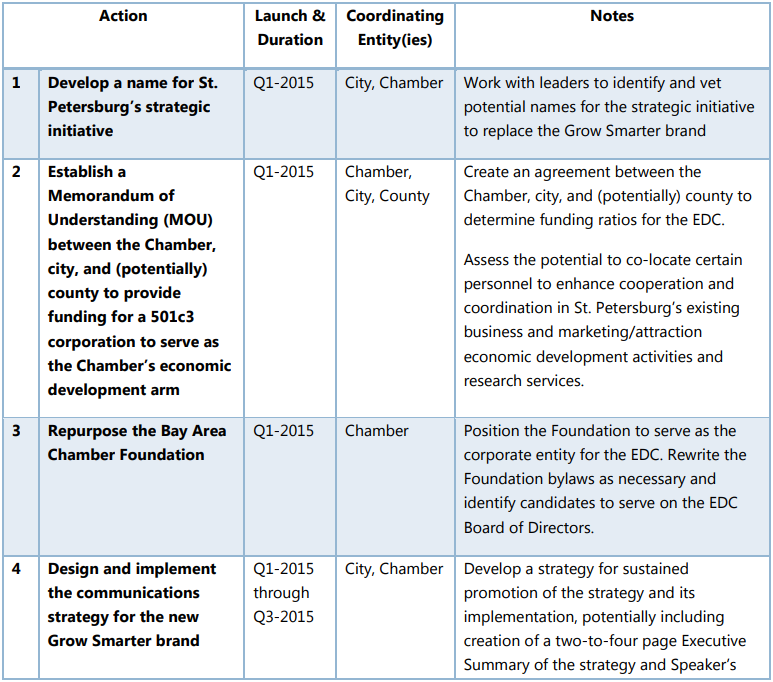
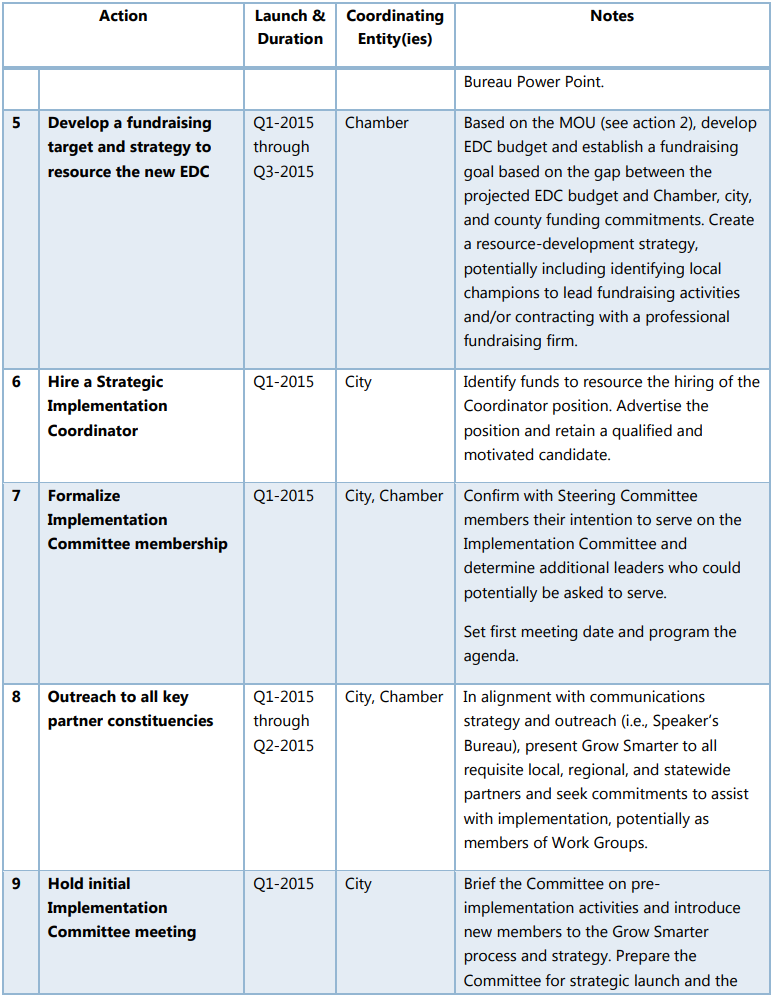
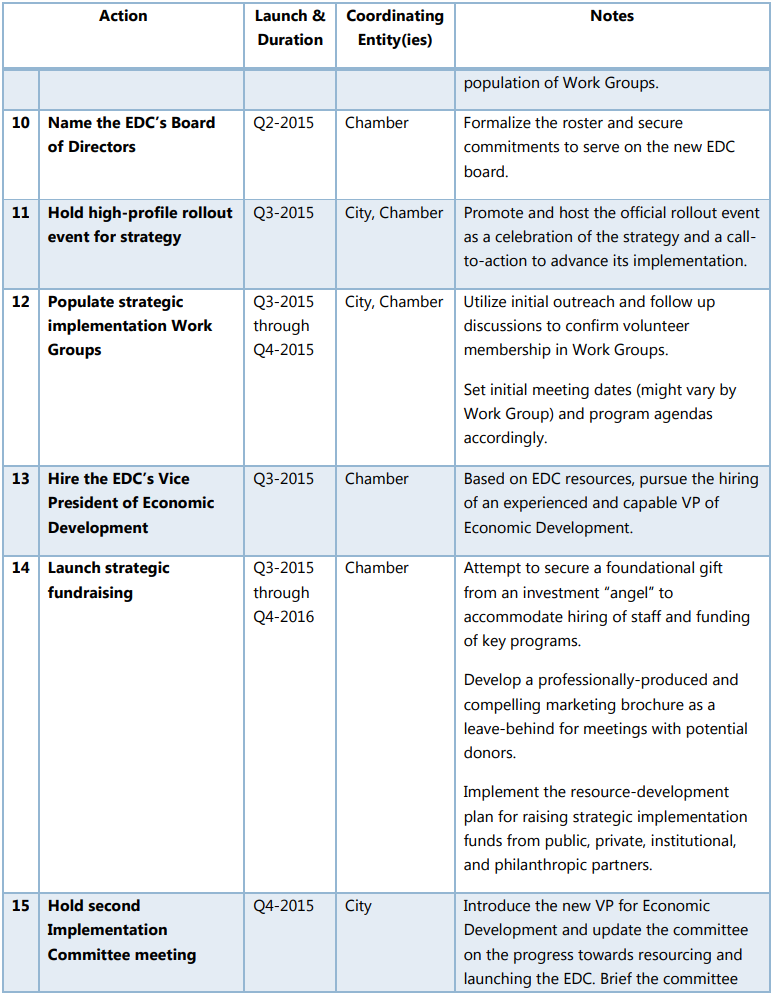
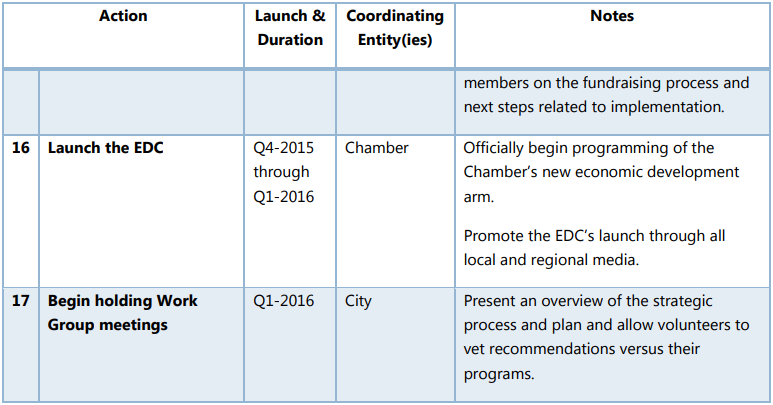
APPENDIX B: IMPLEMENTATION PARTNERS
The following entities will be listed in the First Year Action Timeline found later in this Implementation Plan. It would be very difficult to accurately list every single supporting entity that could contribute to each implementation effort. Implied in the listing of supporting organizations is the fact that outreach will be made to all key St. Petersburg area entities that can assist with implementation of specific efforts.
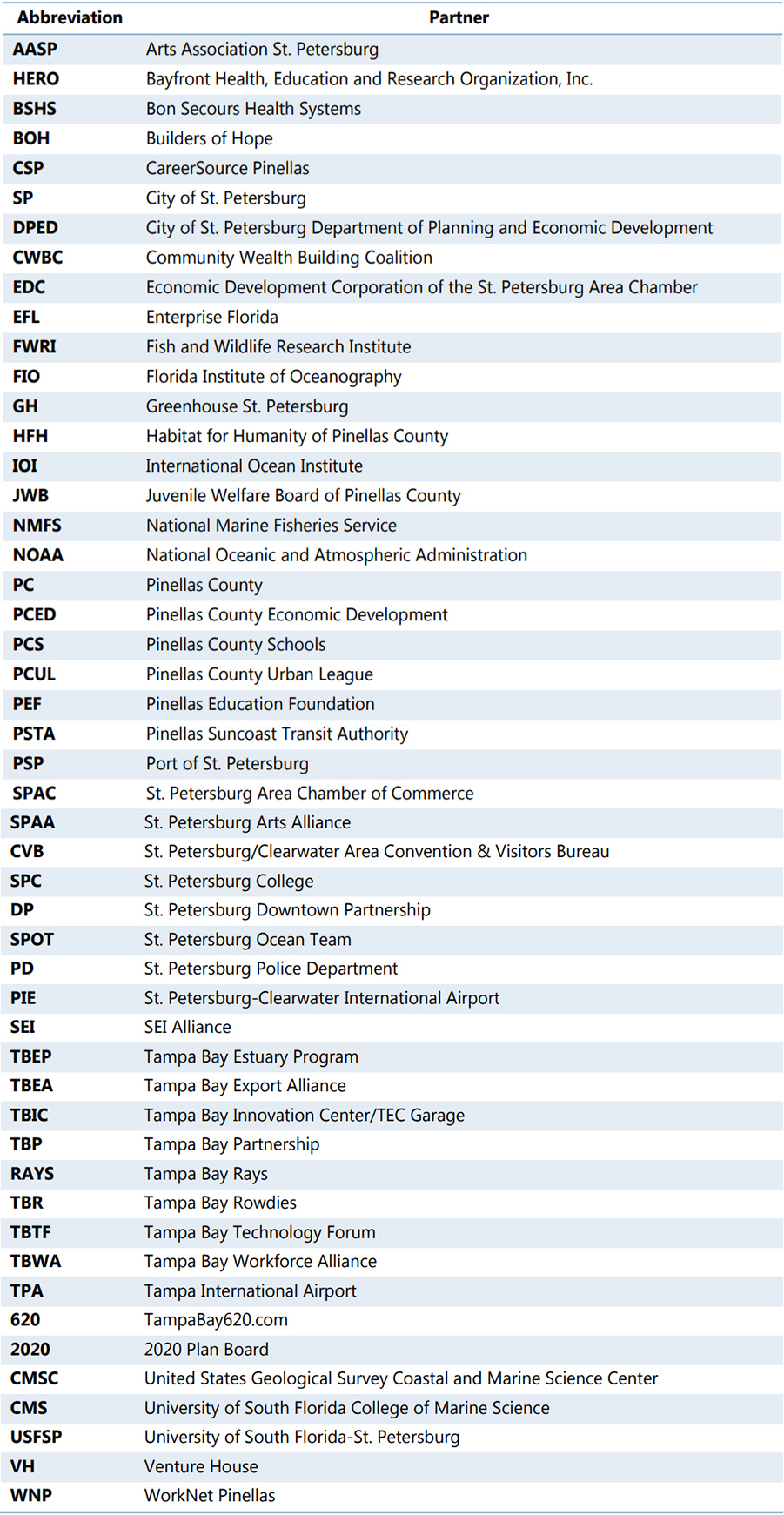
APPENDIX C: FIRST YEAR ACTION PLAN
The following key corresponds to cells in the First Year Action Plan matrix on the following pages.
Implementation partners should always refer to the Grow Smarter Strategy for full descriptions of subactions and strategic activities. For the sake of brevity, certain sub-actions are or will be removed, consolidated, or reworded for the implementation timelines.
Strategic Action NUMBERS correspond to their placement in the Grow Smarter Strategy.
LEAD corresponds to the lead entity(ies) guiding implementation of that action and tasks.
SUPPORT corresponds to the key entities that will assist/influence implementation of that action and tasks.
-
STATUS refers to the existing dynamics of the action and tasks.
O = Ongoing action(s)
E = Expanded/enhanced action(s)
N = New action
-
COST refers to the potential COST RANGE for implementation of that particular action item.
$0 to $10,000
$10,000 – $25,000
$25,000 – $50,000
$50,000 – $75,000
$75,000 – $100,000
$100,000 – $150,000
$150,000 – $200,000
$200,000+
n/a = cost that is beyond the purview of the Grow Smarter Strategy
-
Calendar YEARS and QUARTERS refer to the estimated period of initiation and duration of the action and tasks. The task durations are indicated by the COLOR-FILLED BOXES in the matrices.
Because the launch date of Grow Smarter has yet to be officially determined and approved, the First Year Action Plan will not utilize a specific year/quarter to represent initiation of strategic implementation. Instead, commencement of Grow Smarter will simply be labeled Year 1.
At the beginning of each new year of the campaign, Market Street recommends that the City of St. Petersburg and its partners review past year success and challenges prior to finalizing the current year’s action plan. A variety of factors may require that individual action items be adjusted, particularly in the latter years of the campaign.
Note: there are of course current activities of the Chamber, city, and county that will continue to be worked on even during the interim between the completion of Grow Smarter planning and the official launch of implementation. Many of these are not listed in the Action Plan but are assumed to be ongoing. Most of the actions referenced in the First-Year Plan are new or enhanced activities.
First Year Action Plan
1.0 District and Corridor Development
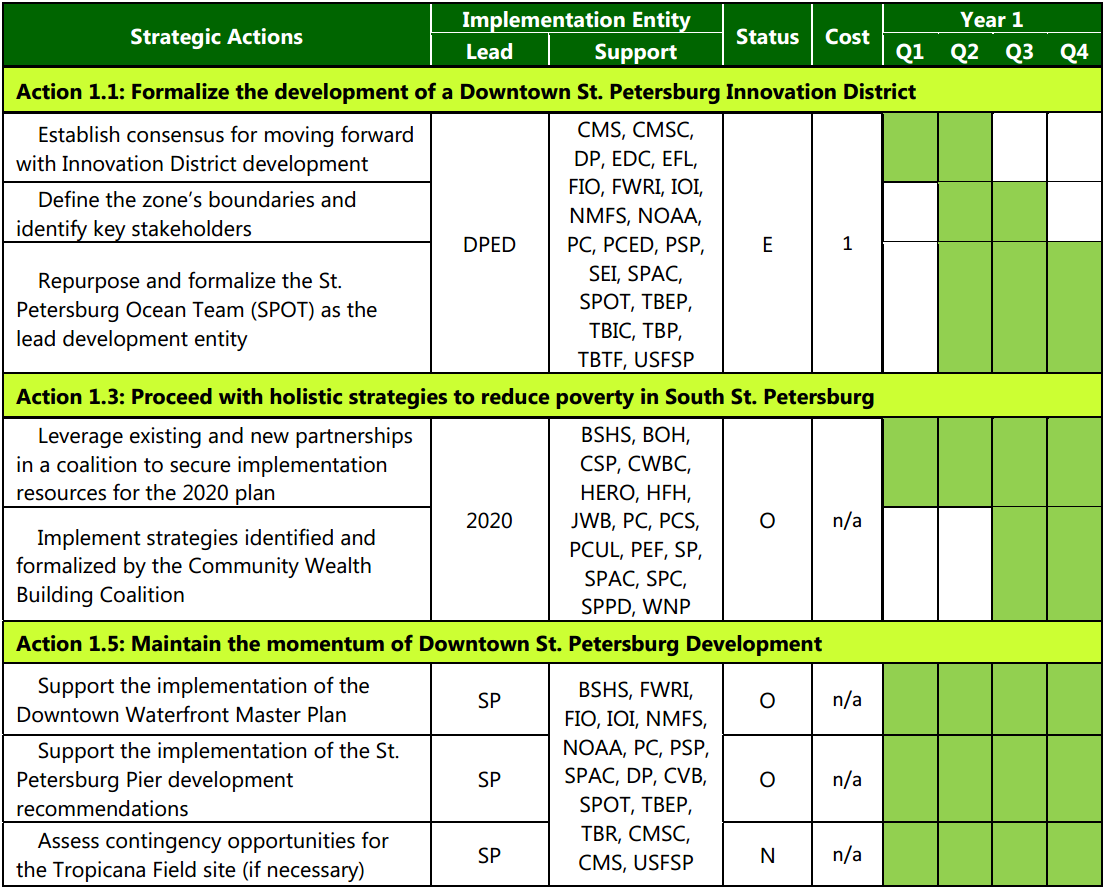
2.0 Targeted Job Creation
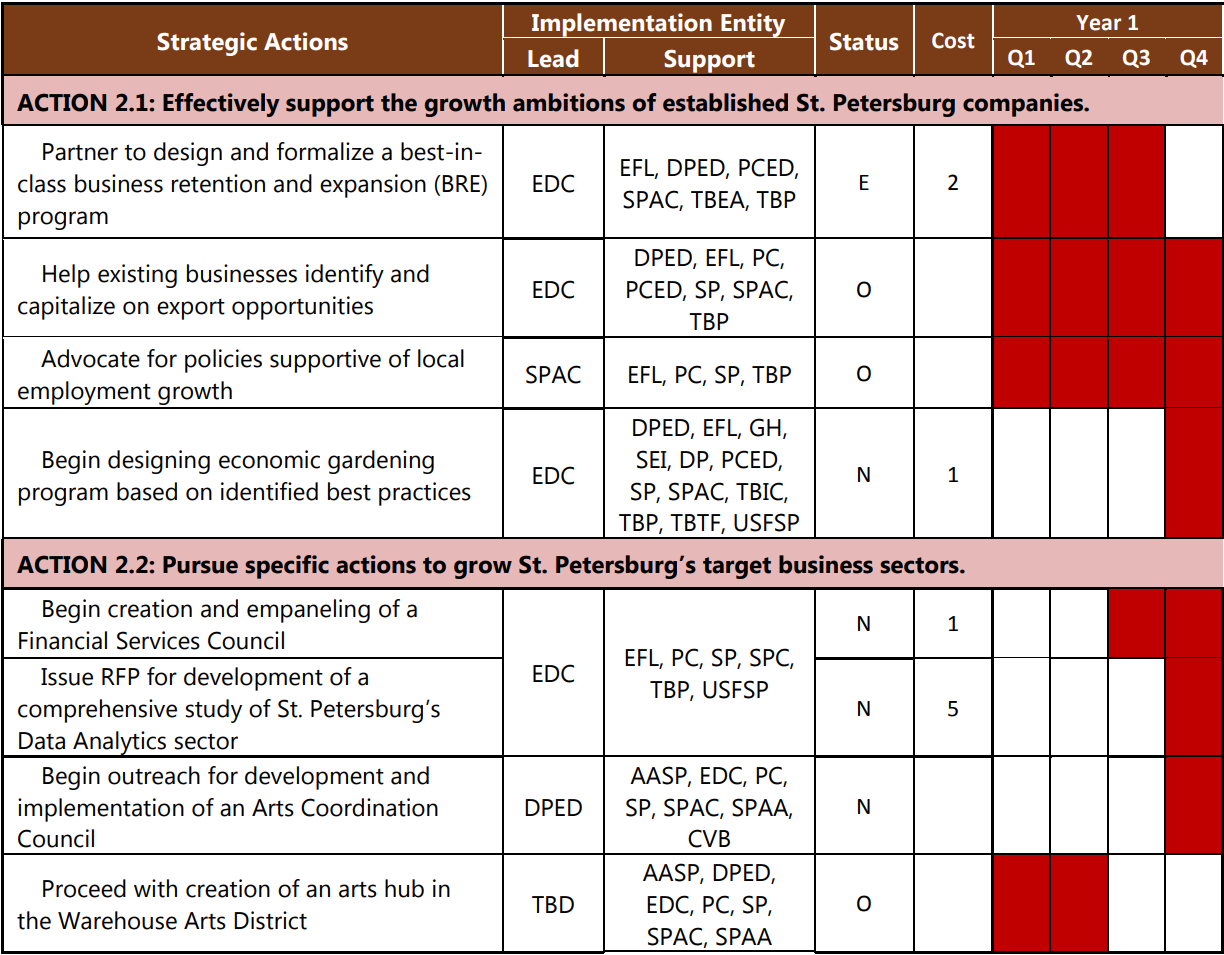
3.0 Awareness Building
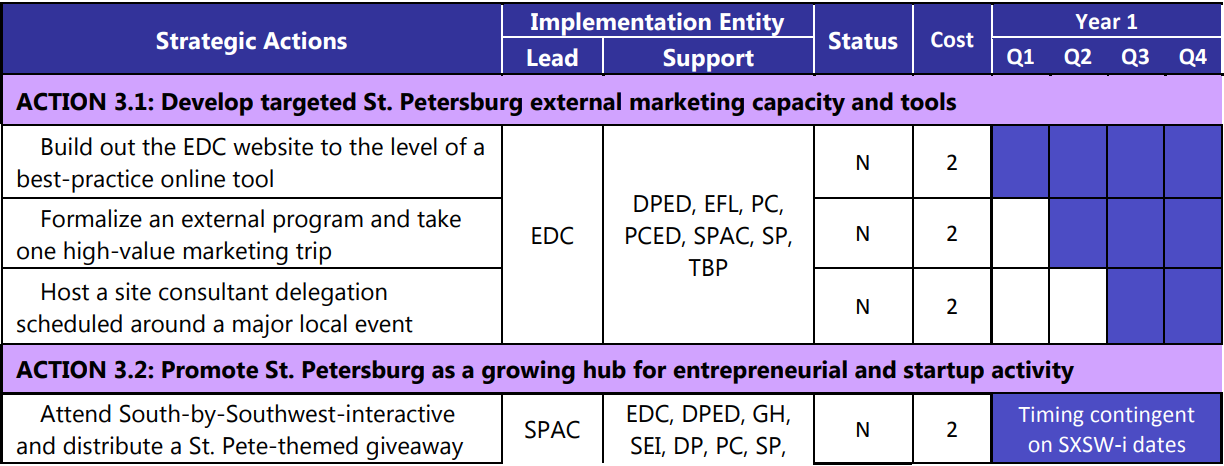
4.0 Entrepreneurial Growth
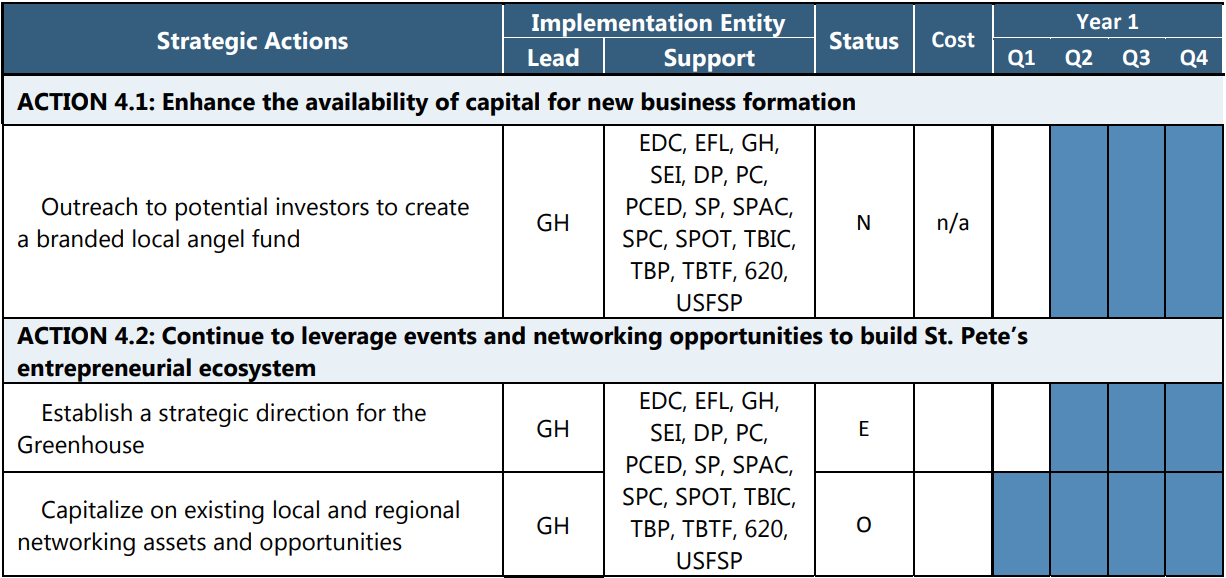
5.0 Coordinated Education and Training
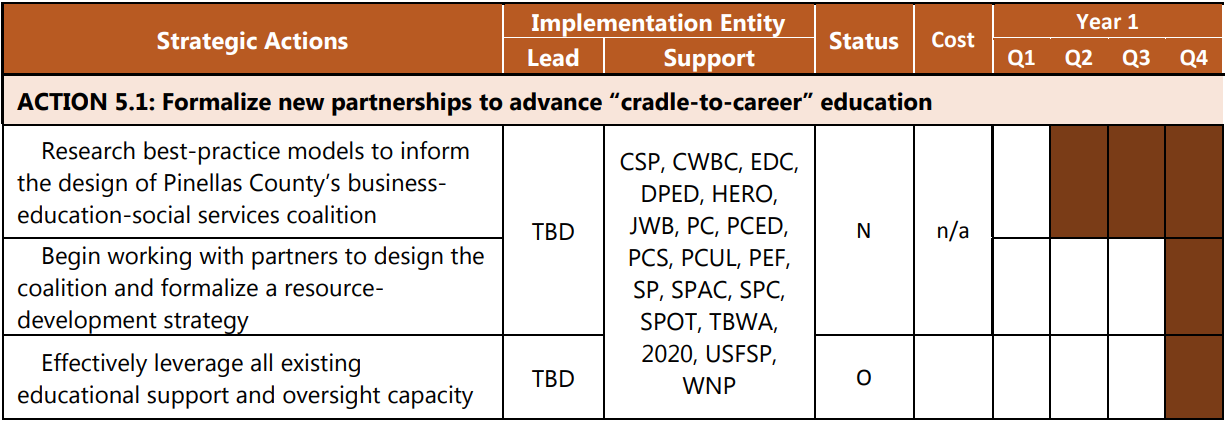
6.0 Culture and Community

APPENDIX D: FIVE YEAR IMPLEMENTATION FRAMEWORK
In recognition of the realities of how comprehensive economic, workforce, and community development strategies are implemented, Market Street has prepared the following framework for the City of St. Petersburg to utilize as a resource for the Implementation Committee and Work Groups during their initial and future meetings and discussions. The framework reflects the following elements:
-
Strategic actions numbered and color-coded by Theme area corresponding to the Grow Smarter Strategy;
-
The estimated Launch Year (Y) of the action based on Steering Committee prioritization and existing/ongoing activities;
-
A Cost Estimate reflective of potential one-time and ongoing fiscal requirements for implementing the components of that action (note: cost of existing and new staff salaries are not factored into estimates):
-
Figures in italics are ongoing costs; certain program-specific expenditures may increase in later years of implementation – these will be reflected in the budget tables included later in this report.
-
Cost estimates only apply to monies that could be resourced for the EDC’s strategic implementation roles. Costs incurred by other implementation entities are not included in estimates.
-
Costs beyond the purview of (potential) strategic resource development may also be noted as “n/a.”
-
-
Initial Implementation dynamics reflect the need for staffing, ownership, and funding of implementation activities during the first two years of Grow Smarter implementation. In some cases, these responsibilities, staff assignments, and governance could be temporary as 1) funds are being raised, 2) another entity assumes a staffing/ownership role over the action(s) based on their own organizational philosophy or programs, or 3) a more appropriate governance entity is charged with overseeing implementation of the action(s).
-
Long-Term Implementation dynamics reflect the projected governance, staffing, and funding realities for each action for implementation years three through five and, potentially, beyond that.
Actions that were either one-time activities or assumed to be completed during the first two years of the Grow Smarter implementation cycle are noted by cells blocked out in gray.
As the Implementation Coordinator, the City of St. Petersburg will maintain a framework that reflects the ongoing governance, staffing, and funding dynamics of the Grow Smarter plan.



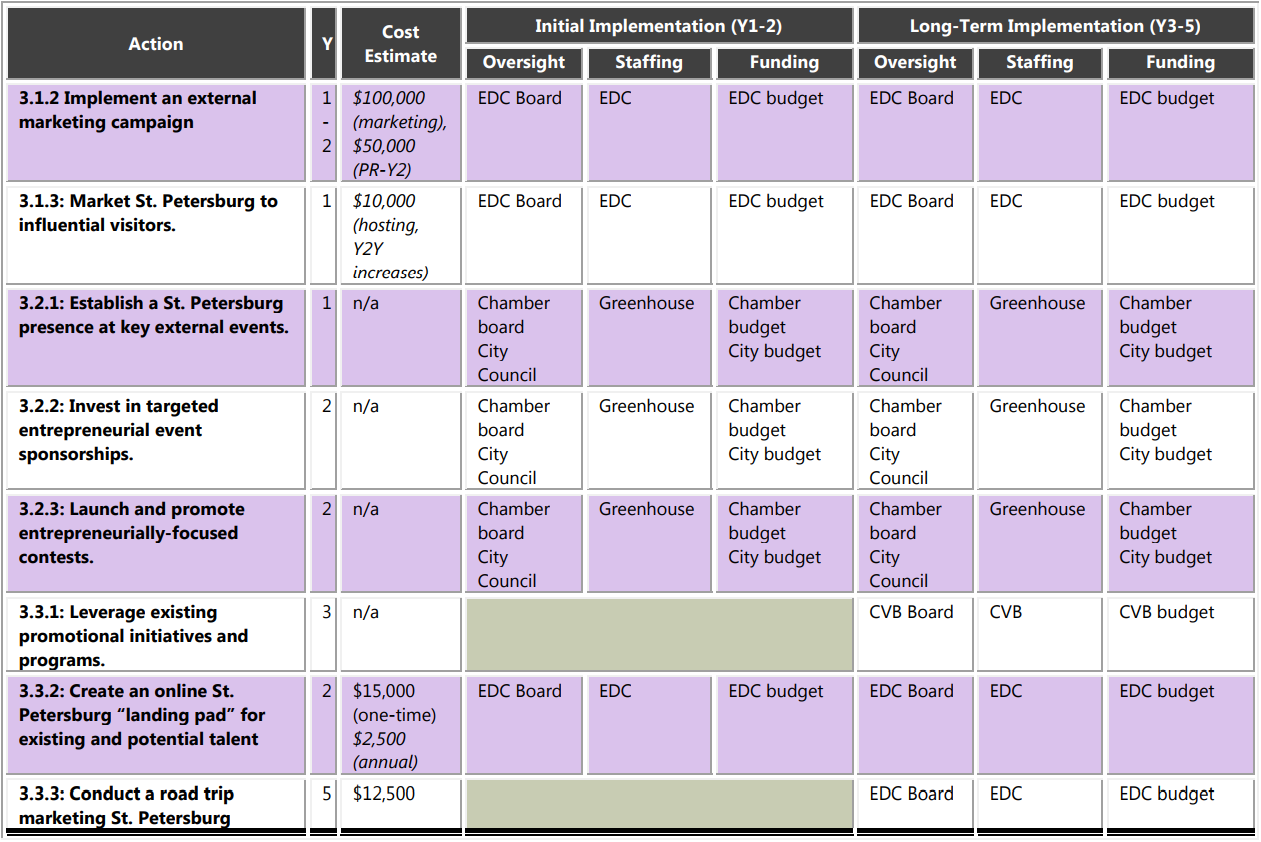
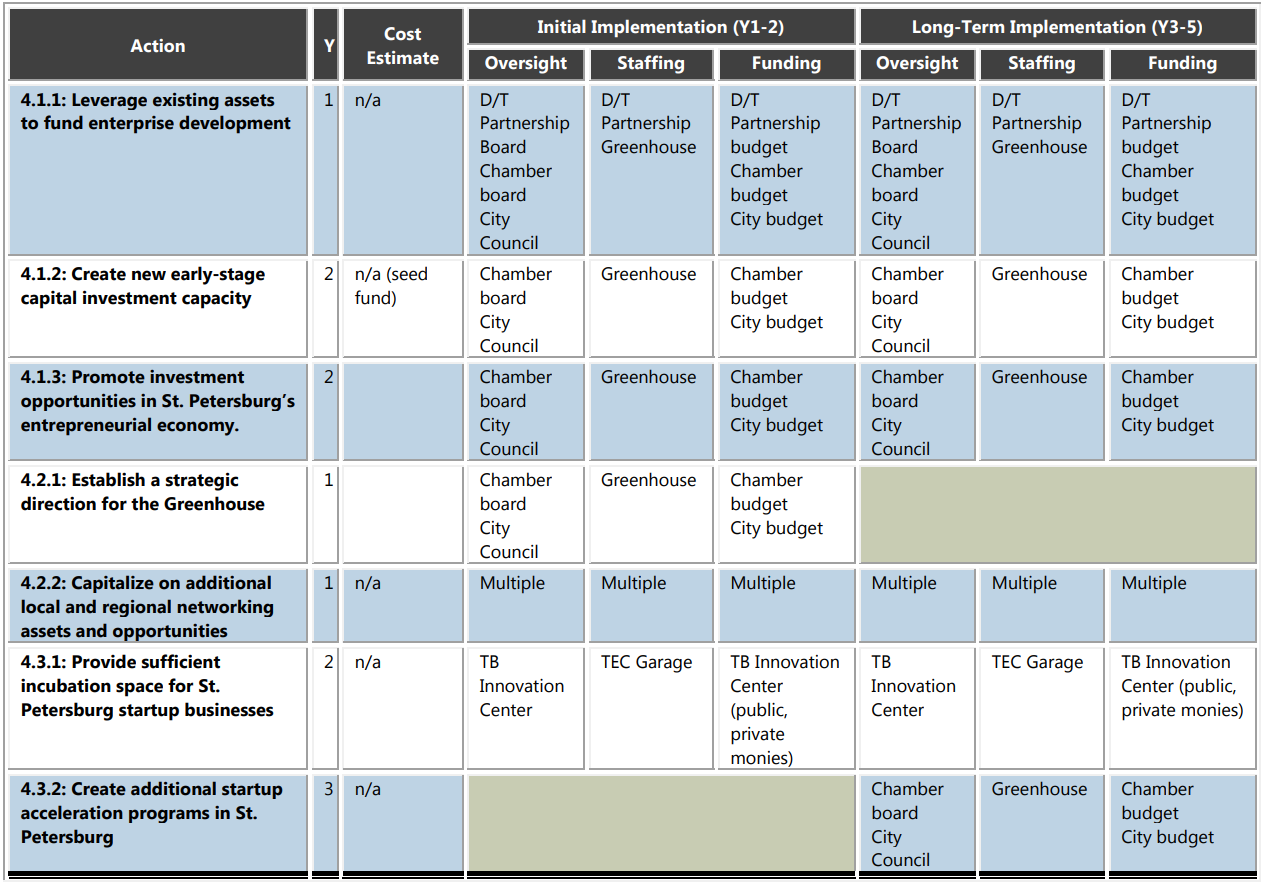
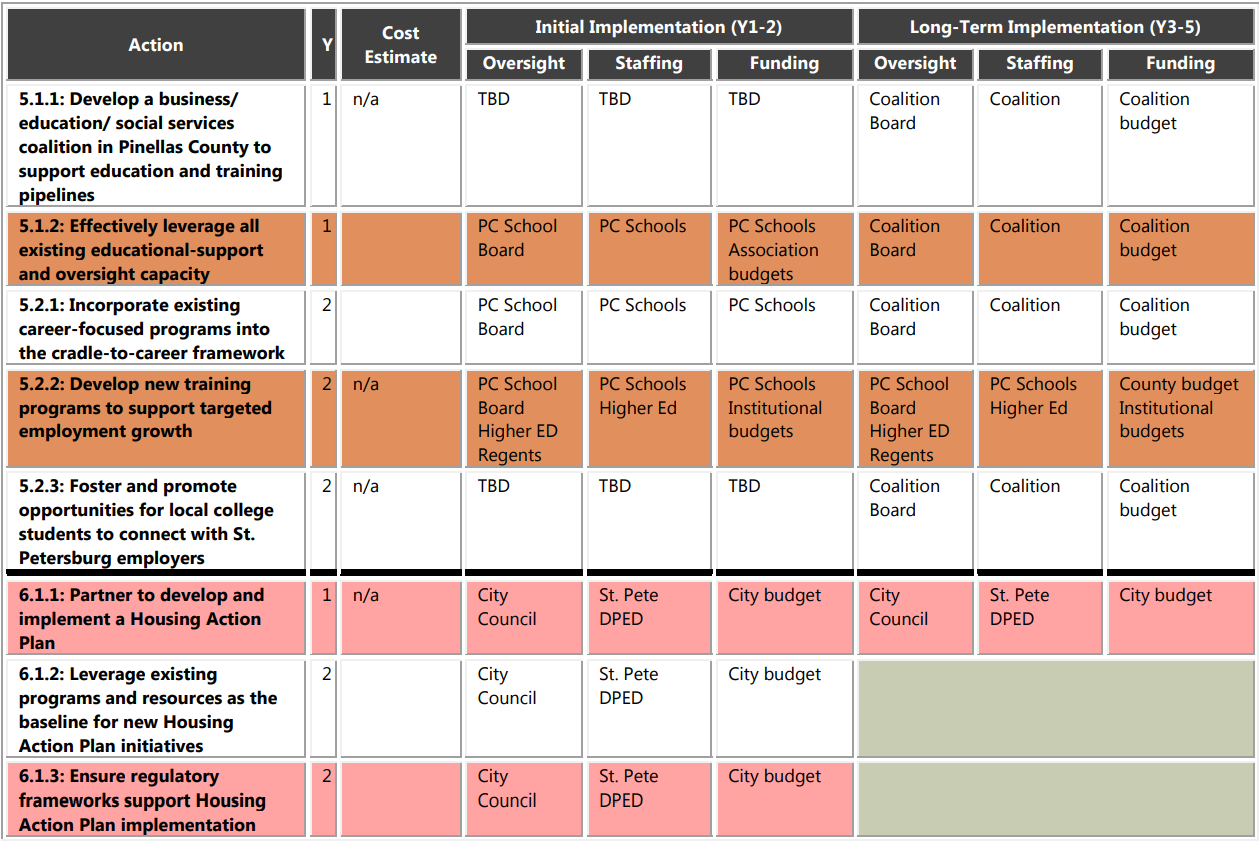
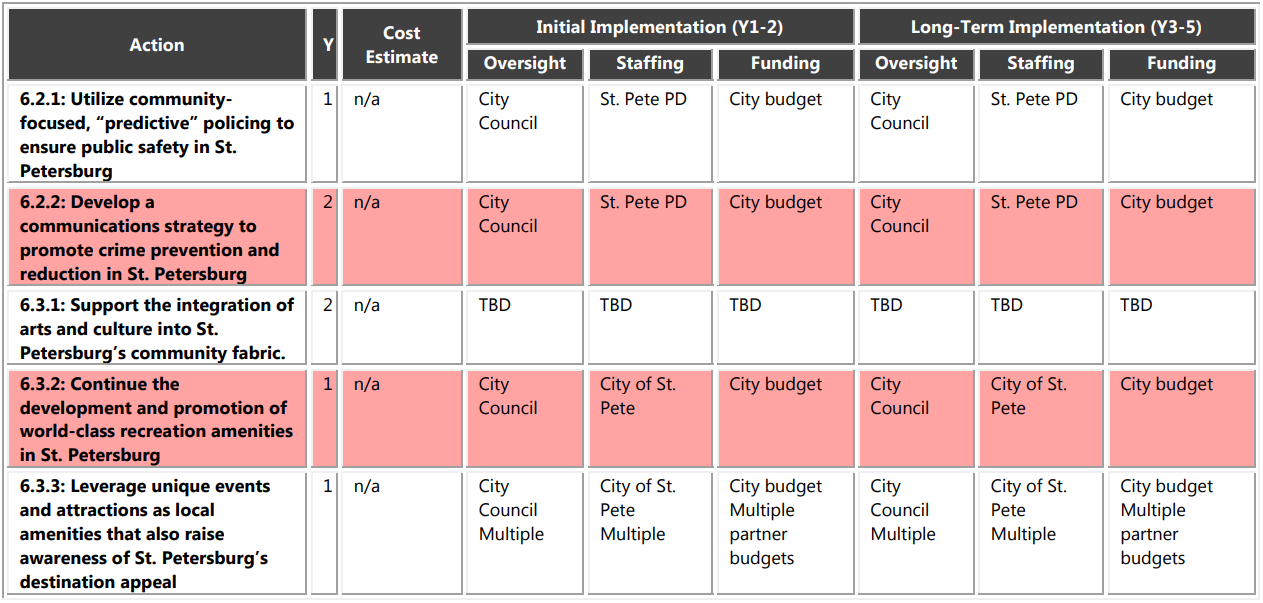
APPENDIX E: PERFORMANCE METRICS
It is likely that a resource-development campaign could be a component of the Grow Smarter implementation process. If so, it will be important that a value proposition can be articulated to investors. As said, many economic development organizations consider the public and private funders of their strategic programming to be the equivalent of investors in a corporation, providing them with quarterly and annual reports and hosting them at annual investors’ meetings. This type of outreach to program investors always includes metrics detailing how the EDO’s region has performed against projected benchmarks over defined implementation periods.
Performance tracking is an important concept because it assumes that trends will improve if the recommendations in the strategy are successfully advanced. This distinction is evident by looking at the “goal versus trend” column in the following table. The trend figure represents the five-year performance of the indicator if current St. Petersburg trends continue. The goal figure represents the benefit that the city can accrue through effective implementation. This delta is the return-on-investment that St. Petersburg can expect based on successful implementation of the Growth Smarter plan.
Market Street arrives at our projections by looking at recent trends, calculating a combined annual growth rate (CAGR) of these measures, and then estimating the incremental improvement that will occur in these trends if the Grow Smarter strategy is effectively implemented. We err on the side of being too conservative, so our projections in many cases may be below actual performance. But the Great Recession proved more than anything else that today’s economy is very volatile and cannot be predicted with absolute certainty.
The following projections include both publicly-reported performance measures based on anticipated implementation success and activity metrics to be tracked internally. They should be used to communicate to implementation and resource partners the efficacy of Grow Smarter activities and act as guideposts to determine year-to-year implementation priorities. Implementation performance should be tracked beginning in 2016.
All data is for the City of St. Petersburg unless otherwise noted.
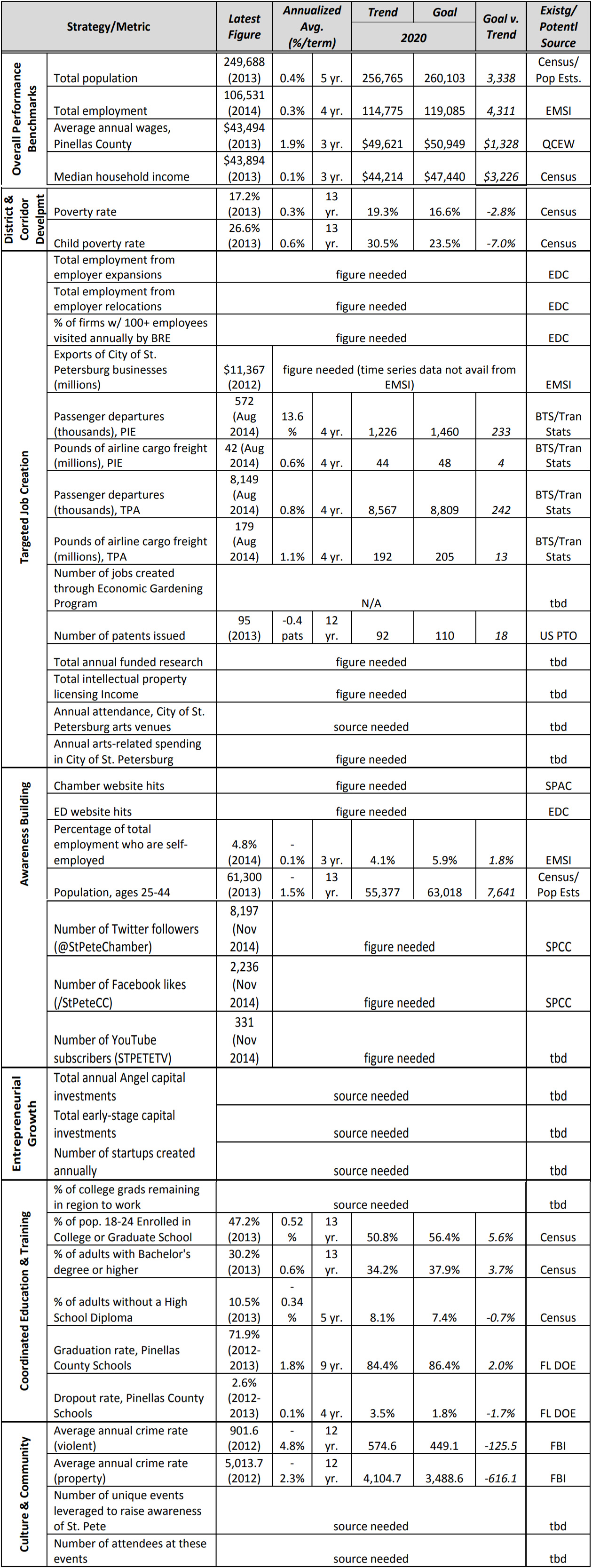
The following Activity Measures chart performance as it relates to the initiation or completion of milestone actions.

